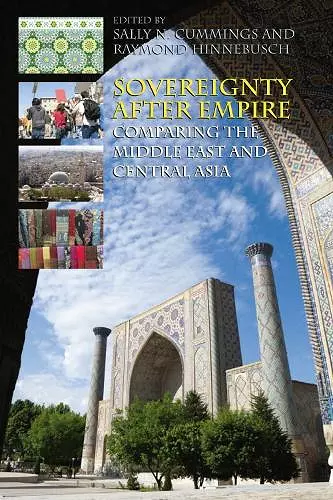Sovereignty After Empire
Comparing the Middle East and Central Asia
Sally N Cummings editor Raymond Hinnebusch editor
Format:Hardback
Publisher:Edinburgh University Press
Published:30th Jun '11
Currently unavailable, and unfortunately no date known when it will be back

A comparative study of empire in the Middle East and Central Asia. Empire matters for post-imperial outcomes, as is shown in this comparative study. The imperial creation of states in MENA and Central Asia explains several similarities in both regions' successor states. Differences in imperial heritages also partly account for the greater instability of the MENA states system and their lesser legitimacy. While eventually the imperial relation to an external metropole came to an end, the social patterns and institutional practices forged in these relationships remained; some only as traces, but others that endured in the transformation of empire into something else, a national sovereignty which should be seen as more than 'neo-colonialism' but less than 'total independence'. This challenges the view of an automatic linear progression from empire to sovereignty and indeed, suggests the two conditions can and do co-exist. Key Features *Combines theory and empirical evidence *Makes systematic comparisons between the Middle East and Central Asia *Includes chapters from leading scholars from history, politics and international relations *Presents the findings of a focused collective research project
'This rich collection provides a thoughtful analysis of imperial rule and the meaning of sovereignty in the Middle East, North Africa and Central Asia. The contributions investigate the impact of the colonial experience on the subsequent trajectories of the ruled, and for their place in a dynamic and changing world.' -- William Fierman, Indiana University 'This is an excellent study of the impact of empire on the post-colonial state and challenges the idea of a sharp break between empire and sovereignty. With its cutting-edge comparison of the Middle East and Central Asia, this is an impressive comparative historical and political analysis which will be a valuable and lasting contribution to the academic literature.' -- Professor Roland Dannreuther, Head of Politics and International Relations, University of Westminster 'In this innovative book, leading international scholars compare notes on the experiences of post-Soviet Central Asia and the successor states of the Ottoman Empire. Theoretically rigorous and informed by important new research, each contributor sheds original light on these diverse Muslim states' transition from empire to sovereignty. A common cultural legacy grounded in Islamic history and a present reliance on hydrocarbons makes this study of two geostrategic regions required reading for scholars and decision makers alike.' -- Eugene Rogan, Director of The Middle East Centre, University of Oxford 'Offering a novel way to understand the political structures of states in two significant areas of the non-European world, this book will make a significant contribution to thinking about the development of the state systems in the former colonial world.' -- Roger Owen, Professor of Middle East History (Harvard) 'This rich collection provides a thoughtful analysis of imperial rule and the meaning of sovereignty in the Middle East, North Africa and Central Asia. The contributions investigate the impact of the colonial experience on the subsequent trajectories of the ruled, and for their place in a dynamic and changing world.' 'This is an excellent study of the impact of empire on the post-colonial state and challenges the idea of a sharp break between empire and sovereignty. With its cutting-edge comparison of the Middle East and Central Asia, this is an impressive comparative historical and political analysis which will be a valuable and lasting contribution to the academic literature.' 'In this innovative book, leading international scholars compare notes on the experiences of post-Soviet Central Asia and the successor states of the Ottoman Empire. Theoretically rigorous and informed by important new research, each contributor sheds original light on these diverse Muslim states' transition from empire to sovereignty. A common cultural legacy grounded in Islamic history and a present reliance on hydrocarbons makes this study of two geostrategic regions required reading for scholars and decision makers alike.' 'Offering a novel way to understand the political structures of states in two significant areas of the non-European world, this book will make a significant contribution to thinking about the development of the state systems in the former colonial world.'
ISBN: 9780748643042
Dimensions: unknown
Weight: 1g
408 pages